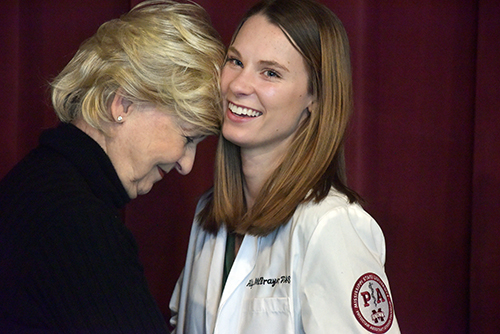Contact: Marianne Todd
MERIDIAN, Miss.—Earning her physician assistant white coat at Mississippi State University-Meridian is more than a ceremonial rite of passage for Alyse McBrayer.
For the granddaughter of the late Dr. William G. Riley, whom she affectionately called “Peepawpi,” McBrayer’s white coat carries not only her own aspirations, but the legacy of her ancestors’ altruism in the very campus and program they helped to create.

William G. Riley was son of the late Franklin Gail Riley, the pediatrician and namesake for whom The Riley Foundation created its philanthropic mission and the cornerstone by which MSU-Meridian’s Master of Physician Assistant Studies was made possible.
McBrayer was one of 28 students to receive a white coat in a Thursday [Feb. 29] ceremony at the MSU Riley Center.
“We’re getting closer to our goal, to begin to communicate with patients and form relationships with doctors and other physician assistants,” said McBrayer, whose initiation was attended by her grandmother, Christine Riley, the wife of William G. Riley.
“I think he would be very proud at this moment,” McBrayer said.
The white coat ceremony is a longstanding tradition, said Shey Washburn, PA program director. It is the symbol of achievement, moving from the didactic phase of education and into clinical rotations with real patients.
“Until about 1900, physicians wore black for their patient interactions since medical encounters were thought of as serious and formal matters,” Washburn told the audience of family and friends.
Just before the turn of the century, painter Joseph Eakins unveiled his renowned painting, “The Agnew Clinic” from the University of Pennsylvania in which a physician was depicted wearing a white coat while performing surgery, she said. Being the image of medical cleanliness and purity, the white coat gained momentum and became the standard garb for surgeons by 1915.
![Students with MSU-Meridian’s Master of Physician Assistant Studies program received their white coats on Thursday [Feb. 29]. The white coat is symbolic that the 28 students in the class of 2025 cohort are prepared to enter clinical rotations.](/sites/www.msstate.edu/files/inline-images/MSUMeridianPAwhitecoat2_HALF.jpg)
“The length of the white coat demonstrates the level of expertise,” Washburn said. “The longer the coat, the more expertise. For the student, it’s a sense of accomplishment. They’ve earned the privilege to go out into their clinical phase. The short white coat distinguishes them from practicing providers’ long white coats, which they aspire to wear shortly.”
It is not uncommon to see physician assistant students in short white coats working alongside graduate physicians and physician assistants who wear longer white coats, Washburn said, adding that the distinction carries with it a badge of honor.
“They are now ready to launch out to care for patients … they must learn and display extraordinarily high levels of professionalism and empathy,” she said.
After receiving their coats, the cohort recited the Pledge of Professionalism in Medicine, a promise to consecrate their lives to humanity.
“I will remember that there is art to medicine as well as science, and that warmth, sympathy and understanding may outweigh the surgeon’s knife or the chemist’s drug,” the group pledged.
McBrayer will fulfill her first rotation in behavioral health in Meridian before traveling to the Gulf Coast for a pediatric rotation.
“It’s been challenging,” she said. “It will be great to get out of the classroom and apply the skills we’ve learned in the past year.”
Upon returning from the yearlong clinical rotation schedule, the cohort will return to MSU-Meridian to prepare for a spring graduation.
For more information on MSU-Meridian’s PA program, visit meridian.msstate.edu/pa or phone 601-696-2320.
Mississippi State University is taking care of what matters. MSU-Meridian is online at www.meridian.msstate.edu.